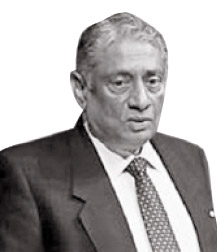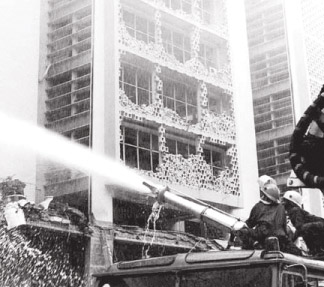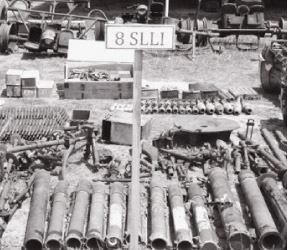Enact stringent laws to tackle int’l terrorism
|

Former Foreign Affairs Minister the late Lakshman Kadirgamar |
“Terrorism is by no means a new phenomenon. It has been with us from
the dawn of recorded history. Every single country in the world, every
civilisation has at one time or another in history suffered the cruelty,
the agony of terrorism” said former Foreign Affairs Minister the late
Lakshman Kadirgamar, at London’s Royal Institute of International
Affairs on April 15, 1998.
Excerpts from the speech:
But what is new today or at least what has been new over the last 30
years is that terrorism has acquired an international dimension. The
international dimension has brought with it new concepts of terror, and
more sophisticated methods of dealing with terror.
The three decades have seen the marriage of high technology,
sophisticated banking and terror, that is new, that is sinister, that is
immensely frightening, particularly to those who are presently the
victims of terror. But the implications of this new dimension, are
something that all of us have to take very seriously even if we are
living today in secure countries.
International terrorism means quite simply terrorism, which is
supported in one form or another from outside the country where the
terrorist act occurs. There is a narrow definition of terrorism that
means state-sponsored terrorism.
|

Central Bank, a civilian target of the LTTE |
Why is terrorist crime so abhorrent? For one thing it is clear that
in the last few years in particular, a number of societies both in the
East and the West, North and South, have suffered from terrorism and
have been very frightened by what has happened. They have been shocked
and revolted. The World Trade Centre bombing in New York and the
Oklahoma bombing a few years ago, caused only 174 deaths, but the
ripples, the shock waves of those two events, were felt very far and
wide in the United States of America. Twenty deaths in one incident is
certainly more sensational, more news worthy than 20 separate incidents
with one death in each incident. But in the United States of America 15
deaths a year are caused by shooting and that is not a matter of
particular alarm. Another aspect of the impact of terrorism is that it
is something which happens indiscriminately. It is something that
happens in a mindless kind of way. But on the other hand even burglary
does not have a relationship between perpetrator and victim, it is also
in a sense mindless.
There is something else about terrorism that causes so much shock
convulsions. I think the terrorist act is seen as an attack on society
as a whole, on democratic institutions. A terrorist attack is an act of
war against society.
Terrorist violence is typically directed towards members of the
public or a section of the public indiscriminately or at random.
Secondly, terrorism frequently involves the use of lethal force and is
capable therefore of causing extensive damage, casualties to the
civilian population. Thirdly, terrorism creates fear among the public
which is precisely what it is intended and designed to do. Fourthly, its
purpose is to secure political or ideological objectives by violence or
threat and therefore aims to subvert the democratic process. Fifthly,
the terrorist act is often committed by well-trained, well-equipped,
highly motivated, more than adequately funded and financed individuals
acting on behalf of organisations often overseas.
Definition of terrorism
In the United Kingdom there is a definition of terrorism. It is to be
found in Section 20 of the United Kingdom Prevention of Terrorism Act.
This is, a useful working definition that it has been found now to be
too narrow. The definition is as follows: “The use of violence for
political ends including any use of violence for the purpose of putting
the public or any section of the public in fear.” In recent years, in
the United Kingdom there have been many inquiries conducted into the
scope and purpose and object of legislation covering terrorism. The most
recent one was chaired by Lord Berwick, and his report was submitted to
the House of Commons in September 1996 and in the course of a very
comprehensive study of the subject, he proposed a wider definition based
on the working definition of terrorism which is used by the Federal
Bureau of Investigation, the FBI of the United States of America. This
definition is acceptable, but there is room for a little further
qualification refinement, - filtering perhaps to catch some of the
nuances or the expressions of terrorism that we are now becoming more
familiar with. Lord Berwick’s definition, with the few additional words
that I propose reads as follows:
“The use of or the threat to use serious violence, Lord Berwick
suggested serious violence against persons or property or the use of or
the threat to use any means to disrupt vital computer installations or
communications”.
We have already come to the stage when interference with computer
installations and electronic communications of various kinds is the
focus of terrorist activity. The definition would go on “to intimidate
or coerce a government, the public or any section of the public in order
to promote political, social, ideological, religious or philosophical
objectives”. I would expand the definition that way bringing in
objectives of terrorism, which are wider than merely political.
There are two basic approaches to terrorism adopted by States. The
first is the ‘Nelsonian’ approach, turning a blind eye! Many States
which are not directly affected by acts of terrorism on their own soil,
but who are aware that terrorist acts are committed on the territory of
other States but where there are links between the terrorists concerned
in the other State and in your own State, adopt a policy of well, what’s
happening is happening somewhere else, those people are their
terrorists, they are not our terrorists, thank heavens for that, we will
wait and see.
Sri Lanka has been the victim of that approach for a long time. It is
one of 4 or 5 countries, which by any reckoning is one of the most
terrorist afflicted countries in the world. The others who might fall
into that category are perhaps Peru, Algeria, Egypt, but certainly,
unarguably Sri Lanka. I have had it said to me in the course of
discussions which I have had on behalf of my Government with other
governments, all friendly governments, I have had it said, “well, we are
very sorry that Sri Lanka is undergoing terrorism of this kind we wish
we could do something to help you, unfortunately there is nothing we can
do because we do not have laws in place that enable us to do anything
about terrorism in your country.”
And when I say that the terrorism in my country is financed to a very
large extent by activities which take place by a certain organisation in
the country where I am discussing this question, I met with the answer
“well, we don’t have much evidence, if you can find the evidence we
might be able to do something about it,” to which my reply has been,
well how can I possibly find evidence of preparations to commit
terrorist activities in my country which are taking place in your
country which is thousands and thousands of miles away from my country.
This has gone on for many years. Then there have been so many occasions
when after a terrorist attack in Sri Lanka, in a city, in a temple, in a
mosque, in a railway train, in a business centre, in a school, numerous
messages of condolence, sympathy and succour arrive and I have often
said to myself, well it is good to know at least that our friends
remember us on these sad occasions, but as the messages have gone on and
on and then one finds that the senders all friendly countries begin to
run out of ‘adjectives’ these condolence messages become repetitive.
It is a question of horror, shock, outrage and then the whole cycle
all over again the next time when a bomb goes off.
The Times of London in its issue of October 23, 1997 in an article
headed “British Tamils fund war in Sri Lanka” - reported the raising of
Pound Sterling 250,000 a month by the LTTE from Tamil nationals living
in Britain. According to this report, the LTTE’s worldwide income is
believed to be about Pound Sterling 1.25 million per month, some of
which goes to humanitarian causes but most of which funds the
sophisticated war machine.
The Times of London is not a hysterical newspaper. Recently one has
become aware of the use by the LTTE of electronic or wire communication
systems or networks to carry out criminal acts. The LTTE has actively
engaged itself in using international information networks such as the
Internet for their fund raising activities to perpetrate acts of
terrorism in Sri Lanka. Appeals have been made through Internet
bulletins, which are designed to appeal to the humanitarian sentiments
of the donor communities but in reality it is aimed at raising funds for
LTTE activities. In these bulletins the LTTE has been specifically
listed as one of the organisations to which funds could be channelled
for, I quote “humanitarian purposes.” These bulletins appeal for
donations to be made to LTTE related organisations based in Western
capitals rather than to recognised international humanitarian
organisations such as the International Committee of the Red Cross and
reputed NGOs based in Sri Lanka. Thus the humanitarian facade is only a
convenient cover for the perpetration of terrible crimes by the
terrorists.
Appeal for money
An appeal for money for the LTTE made through Freenet Carlton of
Carlton University of Canada openly acknowledges that this particular
fund raising is for the purchase of missiles for the LTTE.
Furthermore, the LTTE has also made attempts at interfering and
disrupting E-mail communication systems of the Sri Lanka Government
agencies through technical sabotage. Another development which requires
the immediate attention of the international community is the resort by
the LTTE through its overseas offices to issuing direct threats to
international maritime navigation as evidenced; particularly the threat
issued from its London based International Secretariat at 211 Catherine
Road.
The LTTE does not confine their activities to the mere issue of such
threats it has also demonstrated its policy of unlawfully interfering
with international maritime navigation by attacking vessels in the
territorial waters of Sri Lanka. Such attacks cause violence to persons
on board, caused damage to vessels and cargo and have endangered the
safety of navigation.
In carrying out these acts the LTTE is deliberately targeting the
movement of civilians and foodstuff being transported for distribution
among the people in the Northern Province of Sri Lanka. Their offices in
these capitals continue to be the nerve-centre for the perpetration of
these activities in Sri Lanka.
International co-operation as envisaged in the United Nations
Resolution and Declaration has therefore become vital to set in motion
regulatory controls on the abuse of electronic mail or wire
communication systems and networks recognising that terrorist groups are
now openly abusing Internet facilities for criminal activities with
impunity. Another important issue on which the UN Convention has focused
is the abuse of refugee status. There is a clear linkage between fund
raising activities of terrorist groups in foreign countries and the
trafficking of asylum seekers into those countries. The presence of a
substantial population of asylum seekers on foreign soil greatly
facilitates the generation of funds through extortion.
Apart from supporting the perpetration of terrorist activities in Sri
Lanka, the abuse of asylum and trafficking of persons also facilitates
the displacement of people both internally and externally.
The so-called refugees are known to have exploited and abused the
welfare system generously provided for them by the host country. It
represents a gross distortion of a system of protection that was
provided with purely humanitarian considerations as its objective.
The UN Declaration makes it clear that the convention relating to the
status of refugees does not provide a basis for the protection of
perpetrators of terrorism. In other words, under the new UN Convention
it would not be open to persons who claim the status of refugees to seek
protection if they are found to be guilty of assisting or conspiring in
the commission of acts of terrorism.
I wish to make some proposals with regard to legal measures that
could be taken.
|

The LTTE amassed large stocks of weapons with funds collected
abroad |
First, measures should be taken to introduce necessary domestic
legislation to give effect to international legal obligations undertaken
in the field of the suppression of terrorism, in particular legislation
should be introduced to give effect to the obligations under the
convention on the suppression of terrorist bombings which was passed by
the General Assembly last December. Legislative and other measures
should also be introduced to deal with the abuse of Internet
communication facilities.
Secondly, measures should be taken to reform the law relating to
conspiracy in the United Kingdom. It is well known that there is a
lacuna in the criminal law of the United Kingdom dealing with the crime
of conspiracy. At the moment it is not a criminal offence to conspire
within the United Kingdom to commit or abet the commission of a
terrorist act outside the country. The most recent survey of
anti-terrorism legislation conducted in the UK, that is the Committee
headed by Lord Berwick, came clearly to the conclusion that the most
significant additional measure which the government can take is to amend
the law of conspiracy so as to facilitate the prosecution of those who
conspire here to commit terrorist acts abroad.
Fund raising
Thirdly, the very important question of terrorist fund raising! The
existing legislation in the United Kingdom has provision in the
Prevention of Terrorism Act for curbing fund raising activities of
foreign terrorist organizations. This provision is ascribed by certain
limitations.
It applies only to a certain number of designated countries, 24 in
number, which means it does not apply to countries which are not
designated under the Act and Sri Lanka is one such country, which is not
designated under the Act. Lord Berwick therefore proposes that there
should be a significant extension of the powers conferred on the
authorities in the UK to curb fund raising activities indulged in by
terrorist organizations.
The LTTE is unarguably the most effective, ruthless terrorist
organization that we have seen this century, its role in the United
Kingdom in relation to Sri Lanka is one that gives our people great pain
of mind.
I accept the fact that there are deficiencies in the laws of the
United Kingdom for the simple reason that those laws were not enacted at
the time when all aspects of terrorist activities could be foreseen.
If the laws are deficient they can be suitably adjusted because one
is dealing here with immense human suffering on the one side far away in
a friendly country and the terrorist organisations firmly and
comfortably established in the United Kingdom acting as though they can
do what they like with impunity. |

